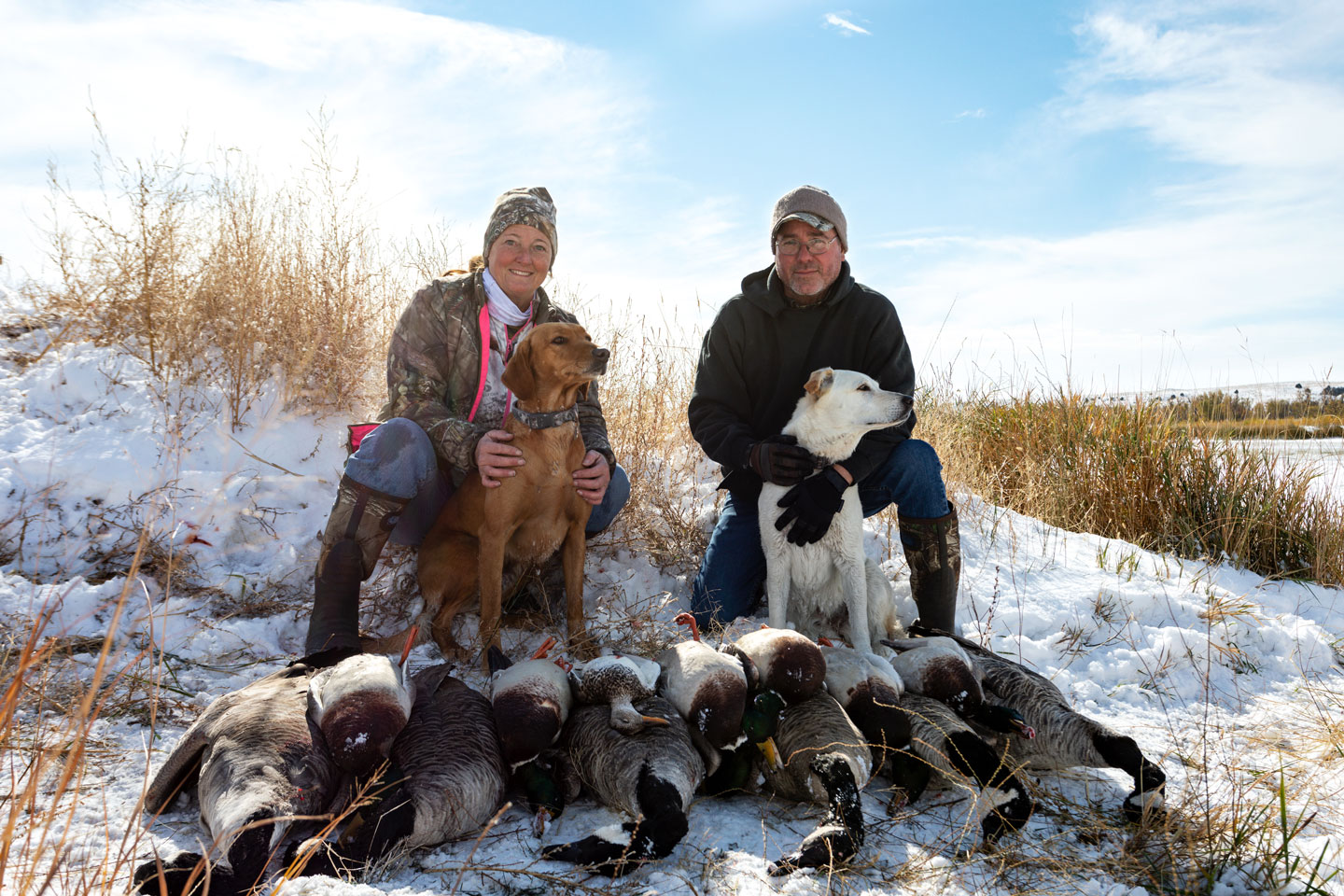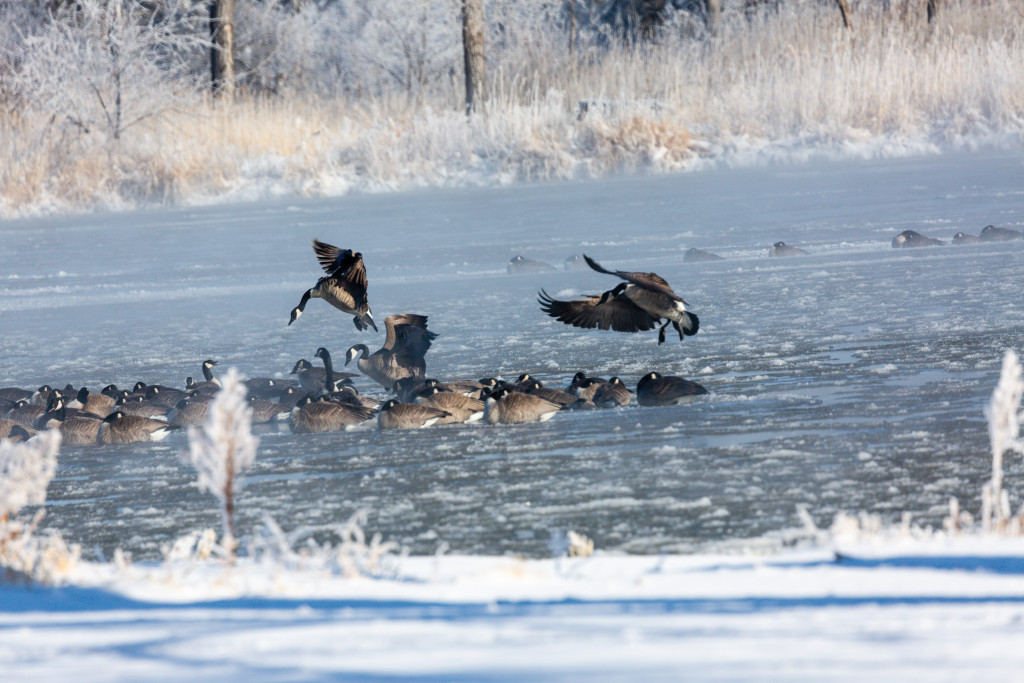
By Julie Geiser
I love to duck and goose hunt and go whenever the opportunity presents itself. One of the first places I hunted waterfowl years ago was at Clear Creek Wildlife Management Area near Lewellen. I still love going to this public hunting area. For those who have never been to Clear Creek, there are a few things to know before you hunt.
When the duck and goose season begins, hunters can access the seasonal refuge and special hunting areas, which has 10 pit blinds available for hunters to use. Both areas are open to hunting, fishing, trapping and other outdoor activities on a first-come, first-served basis until the Monday before Thanksgiving. After that, the refuge becomes a no-hunting, waterfowl refuge, and the pits are drawn for by hunters in the morning at the Clear Creek check station. This is typically the peak of the season and drawing for the blinds is a fair way to make sure all hunters get a chance to hunt.

Before heading out anywhere, I like to check the Nebraska Game and Parks Commission Public Access Atlas online to view the area with GIS. With this tool, it’s easier to set up a plan of attack before stepping foot on the ground, but having hunted for years in this area where very little changes from year to year, I knew the area well.
My husband, Tom, and I usually hunt together as it’s a great way to spend time doing what we both love, and it’s safer to hunt with a partner. We can also carry in more decoys and gear that way as decoys are a must; a dozen or two usually does the trick.
Watching the weather recently, we planned a hunt based on a snow advisory. We packed three sleds with three dozen duck and goose decoys consisting of floaters and shells, along with waders, guns, food, water and a heater as temperatures were slated to dip into the single digits. The third sled was also packed in anticipation of the birds flying and us shooting straight.
We were going to lose an hour driving to the Mountain Time Zone and knew that other die-hard hunters would have the same game plan. We strapped our gear down and loaded the sleds under the topper of the truck, ready to get up with the stars the next morning.
Arriving an hour before shooting time, we quickly parked and unloaded our sleds as two sets of headlights came down the road. We started our 20-minute walk in the snow and cold, the sleds glided smoothly, and we set out to get a pit along the river. Along the trail we met another hunter; he and two friends were setting up in the reeds along the river bank. We wished him luck and kept walking.
As we approached pit eight, the sound of hundreds of birds thundered into flight in front of us — who knew how many ducks and geese were right in front of the pit. Being pitch dark, there was no way to avoid spooking them and getting into the pit undetected. Tom proceeded to set up floating decoys in the river and shells on the sand bar, while I put together Robo ducks, got our gear situated in the pit, hid the sleds in the weeds and lit the heater. Warming in the pit, we were glad we weren’t sitting in the weeds like the young guy we met along the trail and his friends; we’ve done that many times in our younger years.
Luckily, when shooting time arrived, there were great numbers of ducks and geese flying back and forth from the refuge to Lake McConaughy following along the river channel, giving us and the guys hunting from the weeds ample opportunities for shots.
Teal did their normal acrobatic flight, eluding several of my shots, and many landed in front of the pit out of sight along the edge of the river out of the wind. Mallard after mallard came to our calls, and we got our fair share as we lured them close to our decoy spread. What really made my day was watching my dog on her first duck retrieve.
After the sun popped out, the geese started to fly, starting with four that came to check out the dozen goose shells. With wings cupped, the big birds called to us and circled in perfectly for us to drop two. This time, my dog got to retrieve her first goose out of the water. Anyone who hunts with a dog knows how great it is to watch them work and love what they were born to do. It also saves birds from getting away in the current that my old body could never chase down.
A little while later, a flock of eight geese came to our calls. The birds circled three times before locking up over our decoys. Tom shot two as I tried to get my shooting finger out of my fold-over mitten to touch my safety off. Laughing in disbelief, I shook my head. What else can you do in the heat of the moment when things don’t go as expected?
As the sun came out, the entire area changed from cloudy and bitterly cold to a warm 14 degrees.
Our cohorts from downriver were making their way past our pit back to the parking area with almost three limits of ducks — a good day of hunting for them. Tom and I started to pack up for the day with seven geese and six ducks between us — not bad for a few hours of hunting. We were glad we packed that third sled.
We’ll be back to hunt Clear Creek again. Perhaps you should make a trip there yourself.
Clear Creek Wildlife Management Area is located about 4 miles southeast of Lewellen and encompasses more than 6,000 acres of riparian woodlands, wetlands, river channel, lake bed and upland grasslands. Find a map of Clear Creek, and more information here.
